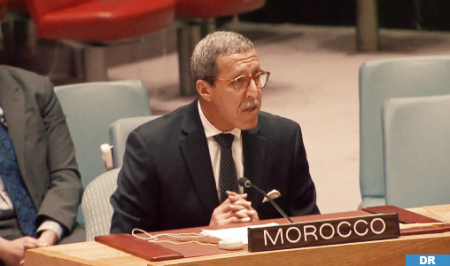Amb. Hilale Pleads Case of Middle Income Countries at UN
Morocco’s Ambassador and Permanent Representative to the UN, Omar Hilale, in his capacity as Chairman of the Group of Friends of Middle Income Countries (MICs), highlighted the priorities of these countries at a high-level event organized in New York by the United Nations General Assembly. Speaking at the opening segment of this event initiated by the UN GA President, Csaba Kőrösi, Hilale said, in this context, that climate action, disaster risk reduction, combating biodiversity loss, preventing desertification, land degradation and drought, promoting sustainable agriculture, as well as the conservation, restoration and sustainable use of ecosystems point to the heart of the Group’s priorities. He noted that several MICs have made progress in implementing their commitments under the Paris Climate Agreement, the Kunming-Montreal Global Biodiversity Framework, the Sendai Framework and other key international multilateral environmental agreements, noting, however, that several limitations remain, and that these countries lack the means to implement all of these commitments. Hilale insisted, in this regard, that comprehensive and ambitious actions aimed at mitigation, adaptation, reduction, prevention and management of disaster risks must be clearly defined and supported by concessional and non-concessional funding. Emphasizing the “critical” role of middle-income countries in global biodiversity conservation, the ambassador said that “timely and predictable” financial and technical support from all sources is crucial to complete their national efforts to protect nature and achieve sustainable consumption and production patterns. He noted that building the capacity of middle-income countries also means greater opportunities to build the capacity of all developing countries through South-South and triangular cooperation initiatives. Hilale further indicated that due to the limitations of the GDP criterion, the majority of MICs have been excluded from several forms of support in all dimensions of sustainable development, including environmental aspects. This has had a negative impact on access to climate and biodiversity finance, mobilization of mitigation and adaptation finance and other channels of international development cooperation, he said. Hilale also stressed that the specific needs and priorities of middle-income countries should not be overlooked, stressing that through “concrete and achievable” solutions, these countries will be able to boost their economic growth and better respond to external shocks and crises. Morocco’s chairmanship of the Group of Friends of MICs is a further recognition of the central role played by the Kingdom in promoting and defending the priorities of emerging and developing countries within the United Nations, in line with the royal vision for effective, efficient and inclusive multilateralism.

